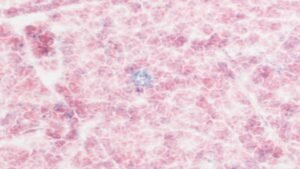A biomedical sciences professor studying T-cells and their effect on cellular senescence believes she may have found a real-life fountain of youth hiding within our own bodies.
Although still in the development stages, the professor’s pioneering method may indeed increase health and “reverse” aging for older patients while also preventing aging-related declines in younger patients.
Humanity’s Enduring Quest for the Fountain of Youth
The idea of a Fountain of Youth that could reverse aging and help people stay young indefinitely was made most famous by Spanish explorer Juan Ponce de León, who led an actual expedition to Florida to search for the magical fountain. However, the idea of a water source that could restore youth or prevent aging has been around since at least the 5th Century B.C.
In recent times, scientists have looked for a less magical solution to achieve these same goals, including promises of drugs or other therapies that could “magically” keep someone young. Unfortunately, all of those promises have come up short, with most advances in human lifespan attributed to better lifestyle choices and modern amenities like clean water, safely stored food, and more traditional advances in fighting disease.
Now, Cold Spring Harbor Laboratory (CSHL) Assistant Professor Corina Amor Vegas and colleagues are heralding advances in T-cell therapies that they believe could represent the closest thing to an actual fountain of youth ever offered by researchers and Spanish explorers alike.
T-Cells Successfully Programmed to Fight Senescent Cells
In their study, which appears in the latest edition of Nature Aging, Amor-Vegas’ team says they have found a way to program the body’s own T-cells to attack senescent cells without harming the cells around them. Senescent cells are cells that have stopped reproducing as the human body ages, and they are considered a prime cause of much of our age-related decline in health.
Unfortunately, they are spread throughout the entire body, making removing or destroying them without damaging surrounding tissue incredibly difficult. Some medicinal therapies do exist, but they must be retaken over time, making them impractical as an anti-aging therapy.
Given this situation, along with humanity’s ongoing quest to defeat Father Time, Amor Vegas wondered if the body’s own “cellular police,” a.k.a. T-cells, could be specifically programmed to kill senescent cells while leaving the surrounding healthy tissue intact. Given that senescence is the professor’s area of expertise, she decided to give it a try.
“As we age, our body accumulates damaged “senescent” cells that our immune system is no longer able to effectively eliminate,” Amor Vega’s staff bio explains. “Senescent cells are responsible for the development of aging and age-related diseases like cancer or fibrosis. My group studies how senescent cells evade the immune system, thereby identifying new therapeutic approaches.”
The team’s focus is a particular type of cell called CAR (chimeric antigen receptor) T-cells. Often called a “living” drug, Amor Vegas’ team determined that CAR T-cells could be manipulated to eliminate senescent cells in lab mice.
After some trial and error, they created a customized T-cell that, when re-introduced to lab mice, performed extremely well at removing harmful senescent cells without any tissue damage or related toxicity. In fact, the researchers report that mice treated with these customized T-cells “had lower body weight, improved metabolism and glucose tolerance, and increased physical activity.”

In effect, the youth and vitality of older mice had been almost magically restored. Even more tantalizing, the younger mice given this same treatment showed clear signs that they were aging slower.
“If we give it to aged mice, they rejuvenate. If we give it to young mice, they age slower. No other therapy right now can do this,” said Amor Vegas.
One CAR T-cell Treatment Could Impart Lifelong Anti-Aging Benefits
According to the researchers, one of the most significant findings of their research is how well these customized T-cells last in the body. For instance, one dose when young seemed to last well into adulthood, even preventing things like obesity and diabetes, which are hallmark conditions of unhealthy aging.
“T cells have the ability to develop memory and persist in your body for really long periods, which is very different from a chemical drug,” Amor Vegas explained. “With CAR T cells, you have the potential of getting this one treatment, and then that’s it.”
So ideally, if the benefits found in the lab mice can be transferred to human patients, these T-cells could theoretically provide anti-aging benefits for life without constantly replenishing them through more treatments.
“For chronic pathologies, that’s a huge advantage,” Amor Vegas explained. “Think about patients who need treatment multiple times per day versus you get an infusion, and then you’re good to go for multiple years.”
Next, Amor Vegas and her lab are planning to explore whether or not these therapies actually extend life spans as well as treat disease and aging. If successful, they may have found the elusive Fountain of Youth five centuries after de León’s failed search, as well as one of the most significant breakthroughs in the history of all medicine.
Christopher Plain is a Science Fiction and Fantasy novelist and Head Science Writer at The Debrief. Follow and connect with him on X, learn about his books at plainfiction.com, or email him directly at christopher@thedebrief.org.
Health - Latest - Google News
January 25, 2024 at 08:10PM
https://ift.tt/xptD0Zm
Did This Biomedical Sciences Professor Just Discover the Fountain of Youth? - The Debrief
Health - Latest - Google News
https://ift.tt/vJNaliX
Bagikan Berita Ini















0 Response to "Did This Biomedical Sciences Professor Just Discover the Fountain of Youth? - The Debrief"
Post a Comment